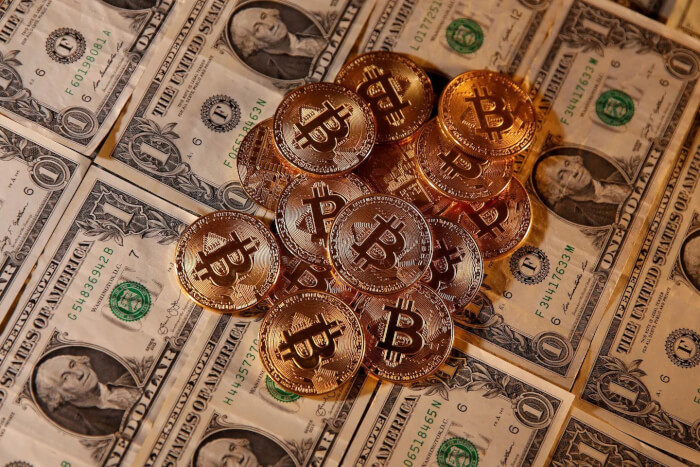America Owns Secret Bitcoin Stockpile Worth Several Billion Dollars, But Where Does This Money Go?
The US government regularly holds auctions for its stockpiles of bitcoin, ethereum, litecoin, and other cryptocurrencies after seizure. However, the auctions’ price range is quite low compared to the market’s.
For example, the 500 bitcoins that the government sold to Riot Blockchain for around $5 million in 2018, is now worth $23 million. 30,000 bitcoins went to billionaire venture capitalist Tim Draper for $19 million in 2014 now could be over $1.3 billion.
The aforementioned bitcoins, along with other valuable assets, were confiscated from high-profile criminal activities. All were sold at a similar discount. " It could be 10 boats, 12 cars, and then one of the lots is X number of bitcoin being auctioned," said Jarod Koopman, director of the Internal Revenue Service's cybercrime unit.
One of the next cases was an auction of $56 million worth of cryptocurrency that the authorities have obtained from a Ponzi-scheme scam involving an offshore cryptocurrency lending program (BitConnect).
Unlike other auctions where the proceeds will be redistributed to Government agencies, the cash from the sale of this cryptocurrency will be used to reimburse the victims of the scam.
The government's crypto holdings and sales are growing fast because they only need the help of the private sector to manage the storage and sale of their hoarded tokens.
The US has largely used outdated crime-fighting tools to track and seize digital currencies with new technology designed to evade law enforcement.
"The government is usually more than a few steps behind the criminals when it comes to innovation and technology," said Jud Welle, a former federal cybercrime prosecutor. "This is not the kind of thing that would show up in your basic training," says Welle. However, he predicts that within the next three to five years, "there will be manuals edited and updated with, this is how you approach crypto tracing, this is how you approach crypto seizure."
Koopman said his department at the IRS typically handles crypto tracing and open-source intelligence, including investigating tax evasion, false tax returns, and money laundering. Other agencies have more money and resources to focus on the technical elements. "Then we all come together when it’s time to execute any type of enforcement action, whether that’s an arrest, a seizure or a search warrant. And that could be nationally or globally," he said.
Many representatives participate in supervision during the seizure process. Among them are the regulators, who set up the hardware wallets necessary to protect the seized cryptocurrencies.
In recent years, the government has collected record amounts of cryptocurrencies. “In fiscal year 2019, we had about $700,000 worth of crypto seizures. In 2020, it was up to $137 million. And so far in 2021, we’re at $1.2 billion," Koopman told CNBC in August.
As cybercrime increases, along with higher transaction volumes, government cryptocurrency vaults are expected to swell even more.
Cryptocurrency auctions are a heavy responsibility that a government organization has to take on. It is for that reason that recently, the Marshals Service no longer has to unilaterally shoulder this task. The U.S. General Services Administration, an agency that typically auctions off excessive federal property, such as tractors, added confiscated cryptocurrency to its auction catalog earlier this year.
In July, after a search that dragged on for more than a year, the Justice Department hired San Francisco-based Anchorage Digital as a custodian for cryptocurrencies seized or forfeited in criminal cases. Anchorage, the first federally chartered bank for cryptocurrencies, will help the government store and liquidate the digital asset. The contract was previously awarded to BitGo.
Sharon Cohen Levin, who participated in the first Silk Road prosecution and spent 20 years as chief of the money laundering and asset forfeiture unit in the U.S. Attorney’s Office for the Southern District of New York, said: “The fact that the Marshals Service is getting professionals to help them is a good sign that this is here to stay.”
Once transferred into either of these funds, the liquidated cryptocurrency can then be put into various categories. For example, Parliament could rescind the amount and give cash to other projects. According to Koopman, agencies that need to use part of the above funds for their own projects can submit an application to the Office of the Treasury for consideration. These proposals are not met every year as there are years when Parliament will decide to take all cryptocurrencies out of the account.
H/T: CNBC
 Source: Getty Images
Source: Getty Images
For example, the 500 bitcoins that the government sold to Riot Blockchain for around $5 million in 2018, is now worth $23 million. 30,000 bitcoins went to billionaire venture capitalist Tim Draper for $19 million in 2014 now could be over $1.3 billion.
The aforementioned bitcoins, along with other valuable assets, were confiscated from high-profile criminal activities. All were sold at a similar discount. " It could be 10 boats, 12 cars, and then one of the lots is X number of bitcoin being auctioned," said Jarod Koopman, director of the Internal Revenue Service's cybercrime unit.
One of the next cases was an auction of $56 million worth of cryptocurrency that the authorities have obtained from a Ponzi-scheme scam involving an offshore cryptocurrency lending program (BitConnect).
Unlike other auctions where the proceeds will be redistributed to Government agencies, the cash from the sale of this cryptocurrency will be used to reimburse the victims of the scam.
The government's crypto holdings and sales are growing fast because they only need the help of the private sector to manage the storage and sale of their hoarded tokens.
Confiscation of Cryptocurrencies
 Source: Blockchain News
Source: Blockchain News
The US has largely used outdated crime-fighting tools to track and seize digital currencies with new technology designed to evade law enforcement.
"The government is usually more than a few steps behind the criminals when it comes to innovation and technology," said Jud Welle, a former federal cybercrime prosecutor. "This is not the kind of thing that would show up in your basic training," says Welle. However, he predicts that within the next three to five years, "there will be manuals edited and updated with, this is how you approach crypto tracing, this is how you approach crypto seizure."
Koopman said his department at the IRS typically handles crypto tracing and open-source intelligence, including investigating tax evasion, false tax returns, and money laundering. Other agencies have more money and resources to focus on the technical elements. "Then we all come together when it’s time to execute any type of enforcement action, whether that’s an arrest, a seizure or a search warrant. And that could be nationally or globally," he said.
Many representatives participate in supervision during the seizure process. Among them are the regulators, who set up the hardware wallets necessary to protect the seized cryptocurrencies.
In recent years, the government has collected record amounts of cryptocurrencies. “In fiscal year 2019, we had about $700,000 worth of crypto seizures. In 2020, it was up to $137 million. And so far in 2021, we’re at $1.2 billion," Koopman told CNBC in August.
As cybercrime increases, along with higher transaction volumes, government cryptocurrency vaults are expected to swell even more.
Cryptocurrency Auction
 Source: Reuters
Source: Reuters
Cryptocurrency auctions are a heavy responsibility that a government organization has to take on. It is for that reason that recently, the Marshals Service no longer has to unilaterally shoulder this task. The U.S. General Services Administration, an agency that typically auctions off excessive federal property, such as tractors, added confiscated cryptocurrency to its auction catalog earlier this year.
In July, after a search that dragged on for more than a year, the Justice Department hired San Francisco-based Anchorage Digital as a custodian for cryptocurrencies seized or forfeited in criminal cases. Anchorage, the first federally chartered bank for cryptocurrencies, will help the government store and liquidate the digital asset. The contract was previously awarded to BitGo.
Sharon Cohen Levin, who participated in the first Silk Road prosecution and spent 20 years as chief of the money laundering and asset forfeiture unit in the U.S. Attorney’s Office for the Southern District of New York, said: “The fact that the Marshals Service is getting professionals to help them is a good sign that this is here to stay.”
Where does the money go?
Once a case is closed and the cryptocurrency has been converted to cash, federal agencies will split the money. Proceeds are typically deposited into one of two accounts: the Treasury's Foreclosure Fund or the Justice Department's Foreclosure Fund.Once transferred into either of these funds, the liquidated cryptocurrency can then be put into various categories. For example, Parliament could rescind the amount and give cash to other projects. According to Koopman, agencies that need to use part of the above funds for their own projects can submit an application to the Office of the Treasury for consideration. These proposals are not met every year as there are years when Parliament will decide to take all cryptocurrencies out of the account.
H/T: CNBC
Share this article
Advertisement